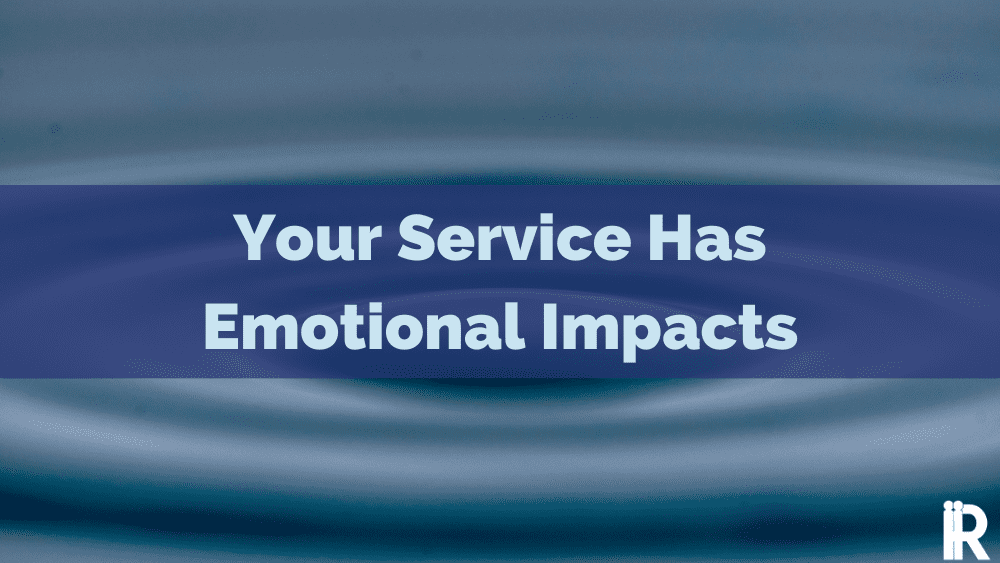Do you as a business know the emotional impact you have on your customers? Or do you care?
The customer experience is an emotional experience. Good or bad, we take our interactions with brands very personally. We are human beings with thoughts, hopes and expectations around how we are treated in our lives, so it makes sense.
Thanks to my customer experiencer “nerdiness”, a lot of people share their service stories with me. It’s pretty great. Two of those stories this week demonstrated how emotional the experience is.
STORIES
Story One: Steffani Cameron, aka The Full Nomad, who’s travelled and worked remotely for 5 years, was flying on Iberia Air, from Athens to Madrid to Morocco (I know her life as a travel writer sounds “horrible”). She and a few dozens of her fellow travellers arrived to wait 2.5-3 hours early in Athens to get their boarding passes and check their luggage before departure. As it was an international flight, most would assume the suggested check-in is 3 hours. Unfortunately, there were no staff there to book passengers in. No one to tell them how long it was going to be. No one to address the group of people. The Iberia Air staff did showed up at exactly 2:05 for a 4:05 flight, demonstrating this was likely a routine — beginning two hours before takeoff — but damage was done, even staff had enough time to get it sorted. Steffani’s words: “All they had to do was pay 90 minutes TOTAL staff payroll and every one of us would be boarding the flight happily. Instead, we’ve been waiting for someone, ANYONE, to arrive and now we’re ALL grumpy and pissed.”
EMOTIONS: Her perception (whether it was true or not) was that it was more important to save a few dollars for the airline than to help and communicate to their customers. She felt marginalized.
Story Two: Dr. Janni Aragon was at Earls and, for the first time in her life, she didn’t tip because she didn’t believe the service deserved it. The restaurant wasn’t busy and the server was rarely available, forcing her to even ask the hostess, who Janni felt did nothing. (She even told the server why she wasn’t leaving a gratuity. I give her kudos for sharing that feedback).
EMOTIONS: Dr. Aragon admitted to me she felt awkward and guilty for not tipping. So much so that when she walked past the restaurant later, she crossed the street prior.
HAPPENS ALL THE TIME
It worries me that businesses don’t get their actions, or lack of actions, emotionally resonate with their customers. That to be customer-centric, the business has to put the customer first. In Steffani’s case, help the customer feel like you care, pay attention and have someone on-site to answer questions and address concerns. In the second story, no one should feel shame or guilt for not rewarding crappy service. Though tipping has become a part of the restaurant experience, it shouldn’t be automatic regardless of the service level. It’s on top of the price for a reason.
But these neglectful actions happen all the time. Ever experience or see…
- Answering and responding to a phone call while serving a customer.
- Putting someone on hold for what feels far too long.
- Being talked over while trying to ask a question or file a complaint.
- Not being responded to on social media.
- Providing robotic “canned” responses.
With bad or neglectful service, you are making customers mad. You are making them frustrated. You are hurting their feelings. And I don’t know about you but I don’t tend to want to hang out, much less give money to, someone who doesn’t treat me well.
SOLUTION: GET HUMAN
In Marty Neumeier’s fantastic book on branding, THE BRAND GAP , he defines it as…
A brand is a person’s gut feeling about a product, service or organization.
So if your brand is about how someone instinctually feels about you, do you think you’re helping your business and your customer relationships if you are thought of as neglectful? Spoiler: you’re not.
People want to be respected, valued, listened to and appreciated. If your actions show you don’t prioritize these wants, you may have a leadership, culture and/or hiring problem. Be human. Treat your customers like humans.
Steve Curtin, author of DELIGHT YOUR CUSTOMERS, highlights Delta Airlines’s method for ensure their staff are a little more considerate. They check if a Delta representative cannot remember their last three customers, they are just processing, not being human. I LOVE that. What a great way to reinforce being aware and being present. (Thanks to Jay Baer for referencing this story in his book HUG YOUR HATERS. It’s how I found it)
How do you think businesses can better take customer’s emotions into their customer service decisions and interactions?






